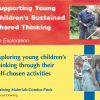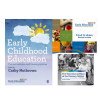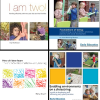Helping children with their behaviour
Children learn how to behave All children are individuals, because they are born with their own character. This is why even children within the same
As schools and settings open up fully once more to all children after yet another long lockdown, now is a really important time for practitioners to talk to the children about settling back in when they may be feeling anxious and confused. Changes over the past year due to the pandemic have undoubtedly had a huge impact on young children in one way or another.
I have recently been involved in putting together a new booklet for Persona Doll Training, focusing on how using Persona Doll storytelling can help to build wellbeing and resilience, giving children an opportunity to air their feelings and collectively find solutions. The booklet is called: Building Wellbeing and Resilience with Persona Dolls and is available for download from the Persona Doll training website.
Persona Doll stories can be really useful in addressing potential anxieties caused by the pandemic. As we say in the new booklet: “If family adult members feel worried, stressed and possibly suffering from illness and loss, this is bound to affect children of all ages and younger children may not find a way to communicate their feelings easily. Children may feel confused, sad and/or angry by not being able to go to nursery or school, not seeing friends or extended family members, or people being ill at home.” They may feel just as muddled and anxious as schools and settings open up once again too. And sadly, the need for practitioners to help children confront the same old inequalities and prejudices as before, such as racism and sexism, continues to be as great a priority as ever.
If you are not familiar with the Persona Doll approach, which is mentioned but not explained in both Development Matters 2020 and in the latest draft (draft 2) of Birth to Five Matters, Persona Dolls are special life-like storytelling dolls, designed to mirror the diversity of human-kind with their range of skin tones, hair types etc., but also in the creation of their Personas, constructed by the practitioners who will be using them, to suit their own setting.
Through the storytelling sessions the children are provided with a supportive safe space where they can celebrate similarities and differences, and consider issues of inequality and exclusion that can be difficult to talk about. The process raises awareness and develops understanding about diversity and prejudice in both the children and adults involved. It encourages children to see themselves as active individuals capable of helping others and so effecting positive social change.
The Persona Doll approach can help us address a vast array of social issues such as racism, Islamaphobia, sexism, ablism, poverty and issues facing refugees and asylum seekers. As Jaclyn Murray points out in her article in the Spring 2021 Early Education Journal:
‘Race’ remains a powerful identity concept that emerges in early childhood as young children wrestle with discourses of difference that circulate in their perspective environments.”
Racism is endemic in society and can just as much be a cause for exclusion amongst young children as it is throughout our communities. It urgently needs to be tackled. As stated in the second draft of Birth to 5Matters:
Talking about ‘race’ is a first step to tackling racism. … Encouraging dialogue and conversation about difference can evoke children’s strong sense of fairness and break down false assumptions about everyone being able to succeed on their merits, so that children recognise racist behaviours and develop anti-racist views…. When adults are silent about race, children’s racial prejudice and misconceptions can be maintained or reinforced.
The Persona Doll stories in the new booklet are model stories for practitioners to use as a basis for their own stories with children in their groups and classes, whether this is face-to-face, or interactive online. The stories are starters for discussion and involve the children – they are the active participants, making links between their own situation and that of the doll, expressing their own feelings, sharing the problem solving, and in the process building up their self-esteem, resilience and wellbeing.
Many of the stories in the booklet have already been told to the children during the past year in and out of lockdowns.
For more information visit our website.
Development Matters, 2020
Birth to 5 Matters
Jaclyn Murray, ‘Narratives of Difference’, Early Education Journal 93, Spring 21
Children learn how to behave All children are individuals, because they are born with their own character. This is why even children within the same
Early childhood seems like a time of constant change to adults. Just as you’ve got used to a predictable daytime nap, your child decides that
Healthy settling for high wellbeing How can we best help children feel at ease so that they are secure and settled in their new provision?
This page was written following our Community of practice about transitions. We had a lot of sharing and questioning about this and so we thought we
Here is a list of books and resources compiled by Anni McTavish to support feelings and behaviour. Reference books Why Love Matters – how affection
When children cry they are telling us something important We need to understand and listen to their tears. Supporting children when they express strong emotions
ACEs: Adverse Childhood experiences On this page we will collate information we find about Adverse Childhood Experiences (ACEs), a relatively new scientific concept impacting early
Animals are special and important to many young children. In fact, even if they do not share their home with a pet, they will meet
by Cathy Gunning Showing empathy creates calm Showing and demonstrating empathy to children who have experienced trauma and have attachment difficulties, can help them to
There is no doubt about it, settling takes time for many children. For others it would appear it takes no time at all. If we






Early Education
2 Victoria Square
St Albans
AL1 3TF
T: 01727 884925
E: office@early-education.org.uk